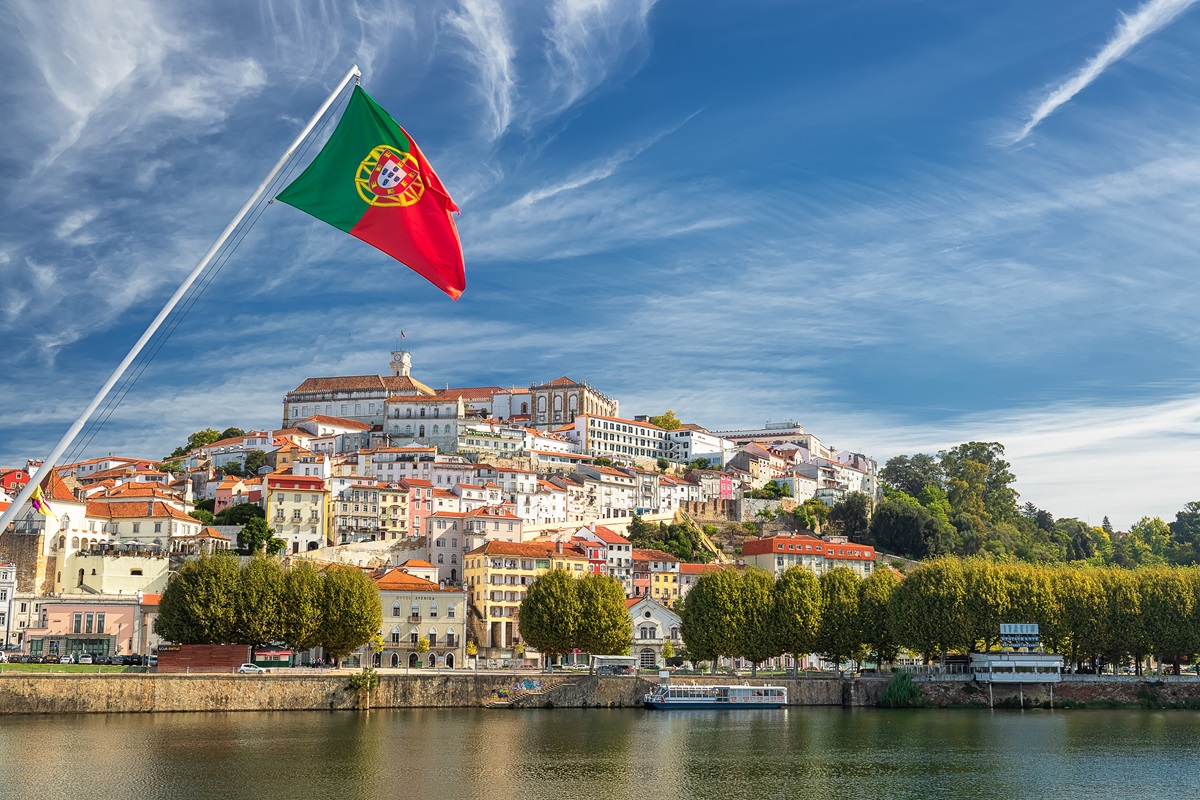Moving from the UK to Portugal has always been attractive, sunshine, slower living, and a lower cost of life compared to London or Manchester.
But since Brexit, the process is no longer as simple as booking a flight and sorting things later.
UK nationals are now considered third-country citizens in Portugal, which means visas, residence permits, and a few extra hoops are part of the relocation story. Add in rising rents in Lisbon, a new tax regime that replaced the famous NHR, and the closure of Portugal’s real estate Golden Visa route, and you’ve got a journey that requires careful planning.
This guide breaks down the process step by step, visas, healthcare, banking, housing, tax, and everyday logistics, so you know exactly what to expect.
Whether you’re retiring with a pension, working remotely on a D8 visa, investing via the Golden Visa, or moving with your family, you’ll find the latest requirements and practical tips to make the transition smoother.
The Post-Brexit Rules & Legal Framework
When the UK left the EU, British citizens lost their right to free movement.
Today, UK nationals are treated as third-country citizens in Portugal and across the Schengen Zone. That means you can still visit Portugal visa-free for up to 90 days in any 180-day period, but anything longer, whether for work, study, retirement, or family, requires a visa followed by a residence permit.
AIMA replaces SEF
Portugal dissolved its old immigration authority, SEF (Serviço de Estrangeiros e Fronteiras), and transferred all responsibilities to AIMA (Agência para a Integração, Migração e Asilo) in 2023.
AIMA now handles visa approvals, residence cards, renewals, and biometric appointments. While the goal was to cut down on long backlogs, in reality, delays remain common. For example, Golden Visa cases can take 9–18 months, sometimes longer, so planning ahead is crucial.
Entry/Exit System (EES)
From 12 October 2025, the EU will roll out the Schengen Entry/Exit System (EES).
Instead of passport stamps, UK travellers entering Portugal (and other Schengen countries) will have their biometric data recorded, fingerprints and a facial scan. This is a one-time registration and free of charge, but it adds an extra step when arriving at the border.
Withdrawal Agreement residents
If you moved to Portugal before 1 January 2021, your rights are protected by the EU-UK Withdrawal Agreement.
You should already have exchanged your old EU residence paper for a biometric residence card from AIMA, which confirms your protected status. Holders of this card are exempt from the 90/180 rule and from the new EES system.
The New Tax Regime: From NHR to IFICI
For more than a decade, Portugal’s Non-Habitual Resident (NHR) program was one of the country’s biggest draws for retirees and expats. It offered generous tax breaks on pensions, foreign dividends, and other passive income. That era is now over.
The government officially closed NHR to new applicants on 1 January 2024, with a transitional grace period for those who had already started the process. By 31 March 2025, that transition window closed.
Anyone moving to Portugal after this date falls under the new regime: IFICI (Incentivo Fiscal à Investigação Científica e Inovação), sometimes nicknamed “NHR 2.0.”
What IFICI Offers
IFICI is narrower and aimed at scientists, researchers, and highly qualified professionals in specific sectors such as tech, medicine, engineering, and higher education. If you qualify, you benefit from:
- A 20% flat tax on Portuguese-sourced professional income (instead of up to 48% under normal rates).
- A 0% tax rate on most foreign-sourced income (like dividends, royalties, or foreign salary), provided a double taxation treaty applies.
The incentive lasts 10 years, just like NHR did.
Residency Visa Pathways
D7 Passive Income Visa
For many UK retirees and financially independent expats, the D7 visa remains the most popular route into Portugal. It’s designed for individuals who can demonstrate a stable passive income, think pensions, rental income, dividends, or investment returns.
Income & savings requirements
- The main applicant must show a minimum monthly income of €870, which equals Portugal’s national minimum wage.
- Add-ons apply for dependents: 50% (€435) for a spouse/partner and 30% (€261) per child.
- Applicants must also place the equivalent of at least 12 months of income into a Portuguese bank account, that’s €10,440 for a single applicant, though lawyers recommend €20,000+ to strengthen the case.
Other requirements
- A Portuguese NIF (tax number) and a local bank account.
- Proof of long-term accommodation, usually a 12-month rental contract or a property deed.
- A clean UK criminal record certificate.
- Health insurance with at least €30,000 coverage across the Schengen Zone.
Application process
It’s a two-step journey. First, you apply from the UK via VFS Global (working under the Portuguese Consulate). If successful, you’ll receive a 120-day visa with two entries permitted. Once in Portugal, you must attend an AIMA appointment for biometrics, after which you’re granted a 2-year residence card.
Residency obligations
To keep the permit valid, you cannot be absent from Portugal for more than 6 consecutive months or 8 months total during the 2-year period.
This pathway leads to permanent residency and citizenship after 5 years, provided the stay rules and financial requirements are consistently met.
D8 Digital Nomad Visa
Launched in late 2022, the D8 visa caters to remote workers and freelancers who earn an income from outside Portugal. Unlike the D7, which focuses on pensions and passive income, the D8 is all about active remote income.
Two pathways under the D8
- Temporary Stay Visa: Valid for up to 1 year, with multiple entries allowed. It’s self-contained and does not lead to residency or citizenship. Ideal for those who want to test Portugal without a long-term move.
- Residency Visa: Starts with a 4-month entry visa from the Portuguese consulate. Once in Portugal, you attend an AIMA appointment for biometrics and receive a 2-year residence permit, renewable for another 3 years. This route leads to permanent residency and citizenship after 5 years.
Income & savings requirements
- Minimum monthly active income: €3,480 (4x Portugal’s minimum wage).
- Proof of savings is strongly recommended: at least €41,760 (12 months of the minimum income) in a bank account, ideally a Portuguese one.
Other requirements
- NIF (tax number) and a Portuguese bank account.
- Proof of long-term accommodation.
- Clean criminal record certificate.
- Health insurance valid across Schengen.
- Evidence of remote work, such as contracts with foreign employers or client invoices.
Residency obligations
If on the Residency Visa path, you must meet the same stay requirements as the D7, no more than 6 consecutive months or 8 months total outside Portugal within the permit period.
This visa has become especially popular with freelancers, IT specialists, and consultants who want Portugal’s lifestyle without giving up their overseas careers.
Golden Visa (Investment Route)
Portugal’s Golden Visa used to be best known for real estate investment, but that option is gone. Since late 2023, the focus has shifted entirely to investments that directly boost the Portuguese economy.
Current qualifying options
- Fund Investment: Minimum €500,000 into a regulated venture capital or private equity fund (not tied to real estate). This is the most popular route today.
- Cultural Donation: €250,000 to support the arts or cultural heritage (reduced to €200,000 in low-density areas).
- Scientific Research: €500,000 contribution to accredited public or private research institutions.
- Business & Jobs: Either create 10 new jobs, or invest €500,000 into a Portuguese company that maintains at least 5 jobs for 3 years.
Minimum stay requirement
The appeal of the Golden Visa is unchanged, holders only need to spend an average of 7 days per year in Portugal.
Residency & citizenship timeline
Golden Visa holders can apply for permanent residency or citizenship after 5 years. In early 2026, the law clarified that the 5 years now start from the date of application submission, not from when the residence card is finally issued (a win for applicants stuck in AIMA’s backlogs).
However, there’s political discussion of extending the citizenship requirement to 10 years, so the landscape is still evolving.
Due diligence considerations
Unlike buying property, fund investments are complex financial products, often with 7–8 year lock-up periods. Applicants are advised to combine legal advice with independent financial due diligence before committing.
This route suits high-net-worth individuals who want EU access with minimal relocation obligations.
D6 Family Reunification Visa
For UK nationals who already hold legal residency in Portugal, the D6 visa is the pathway that allows family members to join them. It’s the formal “family reunification” route and applies whether the sponsor is on a D7, D8, Golden Visa, or another residence permit.
Who qualifies
- Spouse or legal partner.
- Dependent children (including unmarried adult children in full-time education).
- Dependent parents of the resident or their spouse.
Financial requirements
The resident sponsor must show they can financially support their family:
- +50% of the Portuguese minimum wage (€435/month in 2025) for a spouse.
- +30% of the minimum wage (€261/month) for each child.
Application process
- If the family is already in Portugal, the sponsor files a reunification request directly with AIMA.
- If the family is abroad, they apply for a D6 visa at the Portuguese Consulate in their country, which then allows them to travel and complete the residency process in Portugal.
Documentation required
- Proof of family ties (marriage or birth certificates, duly legalized and translated).
- Proof of dependency for adult children or parents.
- Proof of income and accommodation in Portugal by the sponsor.
Residency & rights
Once approved, family members receive a residence permit tied to the sponsor’s visa. They enjoy the same rights to live, work, study, and access healthcare in Portugal. After 5 years, they too can apply for permanent residency or citizenship alongside the primary resident.
This pathway is particularly important for UK nationals who want to relocate first and then bring their families once everything is settled.
Healthcare Access for UK Citizens in Portugal
Accessing healthcare is one of the biggest questions for anyone relocating.
The good news: once you become a legal resident in Portugal, you’re entitled to use the Serviço Nacional de Saúde (SNS), Portugal’s public healthcare system, on the same terms as locals.
But there are a few steps to get there, and some differences compared to the UK system you should know.
Registering with the SNS
To use the public system, you must first register after receiving your residence permit. Here’s how it works:
- Find your local Centro de Saúde (health centre) linked to your residential address.
- Bring the required documents:
- Passport
- Portuguese residence permit card
- NIF (tax number)
- You’ll be issued a Número de Utente (healthcare user number). This is your ticket to appointments, prescriptions, and referrals within the public system.
Most services are heavily subsidised, but not free. Expect small co-payments (taxas moderadoras) for GP visits, hospital treatments, and diagnostics. Children, seniors, and certain conditions (e.g., pregnancy, chronic illnesses) are often exempt.
Role of UK Documents (S1 & GHIC)
Post-Brexit, UK-issued health documents have limited but important uses:
- S1 Form: If you’re a UK pensioner or receive certain long-term benefits, you can apply for an S1 before leaving. Once registered in Portugal, the UK covers your SNS costs. This is a valuable route for retirees.
- GHIC/EHIC: These cards are valid for temporary stays (holidays, short visits) but not for residents. Once you’re a resident, you must use the SNS or private insurance.
Private Health Insurance
Private coverage is mandatory at the visa application stage, since you can’t register for the SNS until you’re a resident. Most applicants buy a plan with at least €30,000 Schengen-wide coverage.
Even after registering with the SNS, many expats keep private insurance. Why? Faster access to specialists, English-speaking staff, and modern private hospitals. Costs are relatively affordable: €50–€150/month depending on coverage and age.
Reality Check: Wait Times & Choices
While the SNS provides good-quality care, waiting times for non-urgent appointments can be long. A GP referral is required to see a specialist in the public system, and delays of several months are not unusual.
Private insurance helps cut through this bureaucracy, giving you same-week or even same-day access.
Finding Accommodation: Renting or Buying Property in Portugal
Securing a home is one of the most important steps in your move. Portugal still offers better value compared to the UK, but the reality in 2026 is more nuanced than the rosy image many guides paint.
Renting in Portugal
- Rising rents in cities: Lisbon and Porto are now some of the most expensive rental markets in Southern Europe. A one-bedroom flat in the city centre can easily range between €900–€1,500 per month, approaching mid-sized UK city levels. Smaller towns and inland regions remain far cheaper.
- Upfront costs: Landlords often require a fiador (a Portuguese guarantor). Without one, it’s common to be asked for 6–12 months’ rent upfront plus a deposit. This can make the first year expensive.
- Lease conditions: Long-term leases are usually for 12 months minimum. Short-term furnished lets are available but cost more and are often aimed at tourists or digital nomads.
Buying Property in Portugal
- Foreign ownership: There are no restrictions, UK citizens can freely buy property.
- Prices: In Lisbon, average prices are around €3,500–€5,200 per square metre, still far below London’s £8,000+ (~€9,400) but a big jump compared to Portugal’s national average. Coastal Algarve and Porto are also pricey hotspots.
- Mortgages: Banks may finance up to 70–80% of the property value, but expect higher interest rates than in the low-rate era of 2020–2022. Most lenders require a Portuguese NIF and proof of income.
- Golden Visa impact: Real estate is no longer an eligible route for residency, so property investment should be seen purely as a lifestyle or financial choice, not an immigration shortcut.
Pros & Cons of Housing in Portugal
Education & International Schools in Portugal
Public Schools
Portugal’s public schools are free for residents and provide solid academic standards.
The main barrier for UK families is language: teaching is in Portuguese, and although children often adapt within a year or two, newcomers may need extra tutoring.
For families planning long-term integration, enrolling kids in a public school can be an effective way for them to pick up the language quickly and blend into local culture.
Private & International Schools
If you prefer an English-speaking environment, Portugal has a well-established network of private and international schools, especially in Lisbon, Cascais, Porto, and the Algarve. Options include:
- British curriculum schools (A-levels, GCSEs)
- American schools (AP program, US diplomas)
- International Baccalaureate (IB) schools, popular with globally mobile families
Tuition & Admissions
- Annual tuition typically ranges from €7,000 to €20,000+ per child, depending on the institution and grade level.
- Admissions can be competitive, particularly in Lisbon and Cascais, so it’s wise to start the application process 6–12 months in advance.
- Many schools require entrance assessments or interviews, and waiting lists are common for primary levels.
Practical Considerations
- School year runs from September to late June, with long summer holidays.
- Transport services (school buses) are usually available, though families in urban areas often opt for private transport.
- Many international schools offer extracurriculars in English, but children may still learn Portuguese as a second language.
Adapting to Life in Portugal: Language, Culture & Lifestyle
Language & Communication
English is widely spoken in Lisbon, Porto, and tourist-heavy areas like the Algarve, but daily life outside these zones is mostly in Portuguese. For smooth integration, learning European Portuguese is key.
Be careful with apps like Duolingo, they often teach Brazilian Portuguese, which has noticeable differences in accent, grammar, and vocabulary. Locals appreciate even small efforts to speak their version.
The Portuguese Way of Life
Life in Portugal moves at a gentler pace compared to the UK. Bureaucracy can be slow and frustrating, but once the paperwork is out of the way, daily life is relaxed.
Expect long lunches, family-oriented weekends, and plenty of festivals marking local saints and traditions. Community is central, and newcomers who engage with their neighbours often find it easier to settle in.
Everyday Customs
Greetings matter: a handshake in formal settings, or two kisses on the cheek among friends.
Punctuality is flexible, being a few minutes late to social gatherings is normal. Mealtimes are social occasions, with lunch often stretching up to two hours.
Fado music, football, and regional festivals are cultural staples, and joining in is the fastest way to feel part of the community.
Tips for Integration
- Join local events and festivals: from Lisbon’s Santo António celebrations to Porto’s São João, there’s always something happening.
- Practice Portuguese in language exchanges: many expat hubs host informal meetups.
- Support small businesses: shop at mercados (local markets) and eat at family-run restaurants.
- Volunteer locally: it’s a great way to give back while meeting new people.
Employment Opportunities for UK Citizens in Portugal
Work Permits & Eligibility
Since Brexit, UK citizens are treated as third-country nationals. That means you need a valid residency visa that allows work, like the D8 Digital Nomad Visa, D2 Entrepreneur Visa, or after securing residency via the D7 or Golden Visa. Once you have a residence permit, you gain full access to the Portuguese labour market.
Sectors in Demand
Portugal’s job market has shifted in recent years, with some areas more open to foreign talent:
- Technology & Startups: Lisbon and Porto have vibrant tech hubs, with demand for software developers, engineers, and digital marketing professionals.
- Tourism & Hospitality: Hotels, resorts, and restaurants remain major employers, especially in the Algarve, Lisbon, and Madeira.
- Healthcare: Portugal faces staff shortages in nursing and elderly care, areas where English-speaking professionals are welcomed.
- Education: English-speaking teachers, especially in international schools, are consistently needed.
- Remote Work: Many expats use Portugal as a base while working for overseas companies under the D8 visa.
Salaries & Working Conditions
Wages in Portugal are lower than in the UK.
- The minimum wage is about €870 per month (14 payments per year).
- Average graduate salaries range between €1,100–€1,500 monthly, while senior tech roles can reach €3,000–€5,000+.
- Work-life balance tends to be better than in the UK, with a 40-hour week and strong labour protections.
How to Find Work
- Online portals: Expats often use LinkedIn, Expresso Emprego, and Net-Empregos.
- Recruitment agencies: Especially useful for specialised roles.
- Networking: Local meetups and expat communities are often gateways to opportunities.
- Language: Speaking Portuguese is a major advantage, especially outside Lisbon/Porto or in customer-facing jobs.
 Portugal
Portugal
 Spain
Spain Italy
Italy Greece
Greece Grenada Citizenship by Investment
Grenada Citizenship by Investment










.svg)